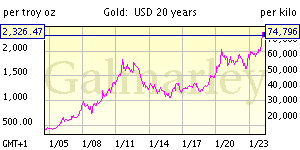its getting a tad Irish at this stage george....
Thats a despicable phrase coming from an Irish man.
Last edited:
its getting a tad Irish at this stage george....
Would not have to comment so much if there were not so many inaccuracies and misconceptions re gold.
A little knowledge is a dangerous thing.


errr . . . I have not "hijacked" any thread cancan.
Nor have i ever started a thread relating to gold.
I have merely reponded to other peoples comments and questions.
Would not have to comment so much if there were not so many inaccuracies and misconceptions re gold.
A little knowledge is a dangerous thing.
suggest you re read this thread and others and you will see that other contributors have frequently thanked me for my comments/ responses.
enjoy your "reverse triple etf"!?! With sugar on top and other leveraged speculations but not for me as are extremely high risk and belong in the casino.
Might as well just go and roll the dice.
Passive long term asset allocation is a slightly more conservative, sensible and prudent strategy in these most uncertain of financial and economic times.

This is simply not true. The early to mid 1980s were miserable everywhere. Property tracked inflation, no more. The UK had a property bubble in the late 1980s fuelled by over optimistic reductions in interest rates. Property prices collapsed in 1989 and didn't re-reach their peak until 1999 (inflation adjusted). The Gulf War pushed the global economy back into recession in 1990-1991. It was not until the mid-nineties that economic growth pretty much everywhere gathered speed.The last period of significant inflation to challenge the western world was in the 1970's and property and particularly gold did well in this period as per the inflation adjusted gold chart from the Economist below.
During this period of stagflation (inflation and low growth), gold rose by some 24 times or 2,400% from $35/oz to over $850/oz.

The 1980's and 1990's were periods of unprecedented economic growth and low inflation with globalisation and the emergence of the BRIC and other emerging markets.
You are assuming purchasing with cash?Fair points yoganmahew, but I would consider good prudent rental property to be an excellent investment and inflation hedge.
I'm not talking about the Irish market here as it is still in a bubble, but there are many areas globally where a rental income stream can be steady and property reasonably valued.
If you can get a steady stream of income and a steady tenant stream, the appreciation potential of the property is irrelevant.
If inflation strikes, interest rates rise, resulting in a stronger rental market.
Investment property can allow you to both protect yourself from inflation and attack inflation (by holding debt).
I would suggest TIPS (inflation-linked bonds) to be both more efficient and less hassle...